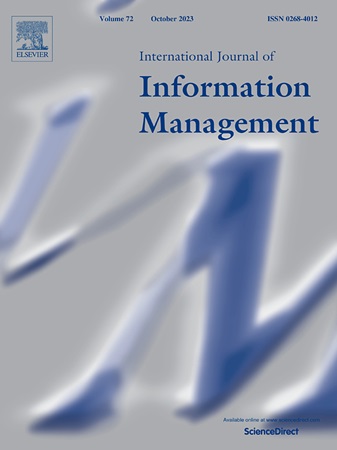解释人-技术动态对数字化转型中人的能动性的影响
IF 27
1区 管理学
Q1 INFORMATION SCIENCE & LIBRARY SCIENCE
International Journal of Information Management
Pub Date : 2025-04-30
DOI:10.1016/j.ijinfomgt.2025.102915
引用次数: 0
摘要
现有的数字化转型理论很少关注人的能动性,以及人的能动性如何受到涉及社会冲突的人类技术动态的影响。为了解决这个问题,我们提供了一个基于社会认知和角色理论的数字转型的补充解释。我们认为,员工的认知和行为影响数字化转型,但这种关系被人与技术动态所产生的冲突所抑制。来自澳大利亚参与数字化转型的256名参与者的调查数据被用来测试所建议的关系。统计结果证实,员工的认知信任是通过员工创新行为直接或间接影响数字化转型的驱动机制。角色冲突削弱了信任与创新行为、信任与数字化转型之间的关系。数字化转型的综合社会认知和角色理论化的实证验证——突出了人类技术互动产生的潜在社会冲突——对数字化转型的战略决策具有重要的理论和管理意义。本文章由计算机程序翻译,如有差异,请以英文原文为准。
Towards explaining the effects of the human-technology dynamic on human agency in digital transformations
The extant theorising of digital transformation has seldom focused on the human agency and how the human agency is affected by the dynamic of human-technology that entails social conflicts. To address this, we provide a complementary explanation of digital transformations grounded in socio-cognitive and role theories. We suggest that employees’ cognitions and behaviours influence digital transformations, but this relationship is dampened by conflicts arising from the dynamic of human-technology. Survey data from 256 participants involved in digital transformations in Australia was used to test the suggested relationships. The statistical findings confirm that employees’ cognitive trust is the driving mechanism that affects digital transformation both directly and indirectly through the innovative behaviour of employees. Role conflict was found to weaken the relationships between trust and innovative behaviour and trust and digital transformation. The empirical validation of the integrative socio-cognitive and role theorising of digital transformations—highlighting the potential social conflicts arising from the human technology interactions—has important theoretical and managerial implications for the strategic decision-making governing digital transformations.
求助全文
通过发布文献求助,成功后即可免费获取论文全文。
去求助
来源期刊

International Journal of Information Management
INFORMATION SCIENCE & LIBRARY SCIENCE-
CiteScore
53.10
自引率
6.20%
发文量
111
审稿时长
24 days
期刊介绍:
The International Journal of Information Management (IJIM) is a distinguished, international, and peer-reviewed journal dedicated to providing its readers with top-notch analysis and discussions within the evolving field of information management. Key features of the journal include:
Comprehensive Coverage:
IJIM keeps readers informed with major papers, reports, and reviews.
Topical Relevance:
The journal remains current and relevant through Viewpoint articles and regular features like Research Notes, Case Studies, and a Reviews section, ensuring readers are updated on contemporary issues.
Focus on Quality:
IJIM prioritizes high-quality papers that address contemporary issues in information management.
 求助内容:
求助内容: 应助结果提醒方式:
应助结果提醒方式:


